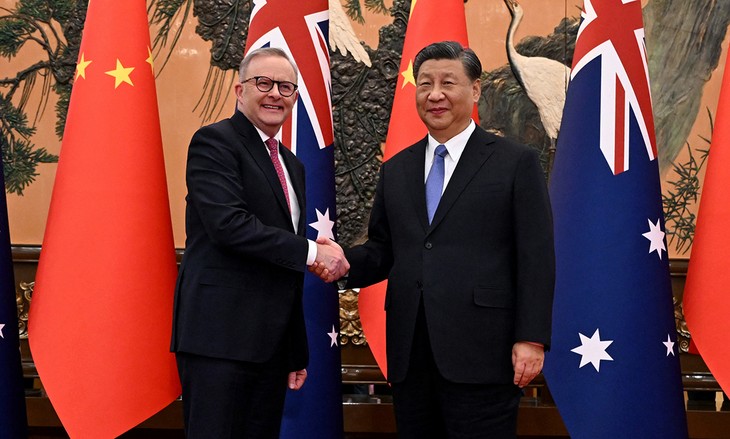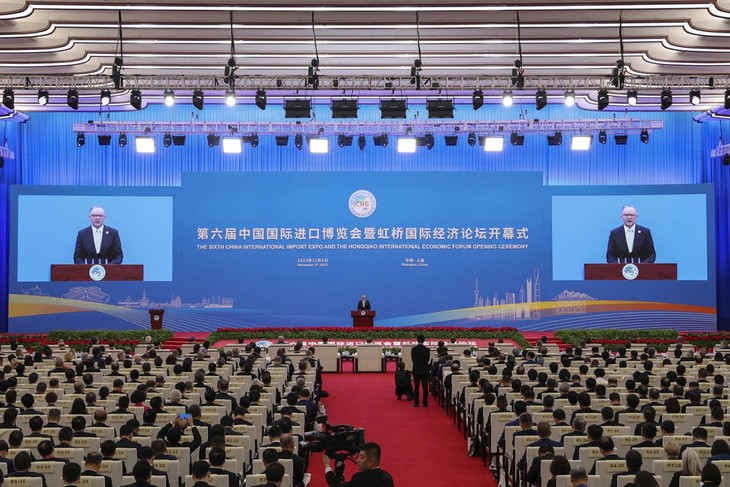(VOVWORLD) - Australian Prime Minister Anthony Albanese is visiting China to recover momentum for China-Australia relations after three years of conflict over trade, investment, security, and politics.
 Chinese President Xi Jinping and Australian Prime Minister Anthony Albanese meet in Beijing on Nov 6, 2023. (photo: Reuters) Chinese President Xi Jinping and Australian Prime Minister Anthony Albanese meet in Beijing on Nov 6, 2023. (photo: Reuters) |
Prime Minister Albanese arrived in China last Saturday. He attended the International Import Expo in Shanghai, delivered a speech at the Hongqiao International Economic Forum, and held bilateral meetings with high-ranking leaders of China. This is the first visit of an Australian Prime Minister to China in seven years, marking the end of three years of serious disagreement and moving toward a more stable future.
Trade and political tension
China has been Australia's largest trading partner for more than a decade. Bilateral trade between Australia and China in the last 12 months totaled 303 billion USD, one-third of Australia's total trade turnover.
China is Australia’s biggest export market, accounting for almost a third of Australia’s total export volume and more than the next three biggest markets combined.
Over the past two decades, Australia's exports to China have grown at an average rate of 17% annually. Australia has always had a trade surplus, with a record 100 billion USD surplus in 2021. Australia was China’s 13th largest export market last year, and is a supplier of many important minerals such as iron ore, coal, and lithium.
But, bilateral relations became tense in early 2020, when the government of former Prime Minister Scott Morrisson called for an international investigation into the origin of COVID-19 at a time when China was fighting the pandemic.
Bilateral relations plummeted after a series of events, such as Australia banning China’s Huawei Corporation, canceling its participation in China's "Belt and Road" Initiative, and controversies over regional investment and security issues.
China then imposed trade restrictions on Australian exports of coal, grain, wine, and wood, issued a travel warning to Australia, and suspended all bilateral political exchanges from mid-2021.
The Australian government estimates that trade tensions with China have cost Australia about 20 billion USD per year over the past 2 years. Although there are no statistics, economists say tensions with Australia have also been costly for China, because Australia is an extremely important source of input materials for China’s steel processing industry and electric car battery production, sectors vital to China's post-pandemic recovery.
 Australian Prime Minister Anthony Albanese addresses the opening ceremony of the China International Import Expo in Shanghai, China, on November 5, 2023. (Photo: Jin Liwang/XNA/AP) Australian Prime Minister Anthony Albanese addresses the opening ceremony of the China International Import Expo in Shanghai, China, on November 5, 2023. (Photo: Jin Liwang/XNA/AP) |
Stabilizing bilateral relations
Leaders of both countries acknowledge the need to quickly improve bilateral relations. Since taking power last May, Prime Minister Albanese has pursued an active dialogue with China, based on the principles of cooperation when possible, direct talks when necessary, and not ignoring differences. Since the end of last year, China has also actively pursued contact with Australia at multilateral forums to warm up their bilateral ties.
Earlier this year, China removed unofficial bans and restrictions on Australian goods, including coal and barley. In October the two sides officially suspended a dispute at the World Trade Organization over China’s tariff of up to 218% on Australian wine. Recently, Australia decided not to review a Chinese firm’s lease at its Darwin port.
Following these positive actions, Prime Minister Albanese’s visit to China marks an end of 3 years of tension. His approach to the relationship with China has been "patient, deliberate and measured," intending to ensure the interests of both countries are addressed "because that is the way that good diplomacy works."
Constructive economic engagement between countries helps build relationships. The government he leads will continue to work constructively with China, said Albanese.
Improved relations with Australia, a major trading partner, will benefit China economically and will also ease tensions with the West and increase stability in the Asia-Pacific. Chinese President Xi Jinping said at the meeting with Prime Minister Albanese on Tuesday: “We both agreed to engage with each other in a more mature way. A healthy and stable China-Australia relationship serves the common interests of our two countries and two peoples. It also meets the common expectation of countries in our region. It is important that we keep improving the comprehensive strategic partnership between our two countries.”
Observers say that despite unpredictable changes globally, China and Australia have put aside their disagreements and stabilized their relationship to pursue bigger, long-term goals.